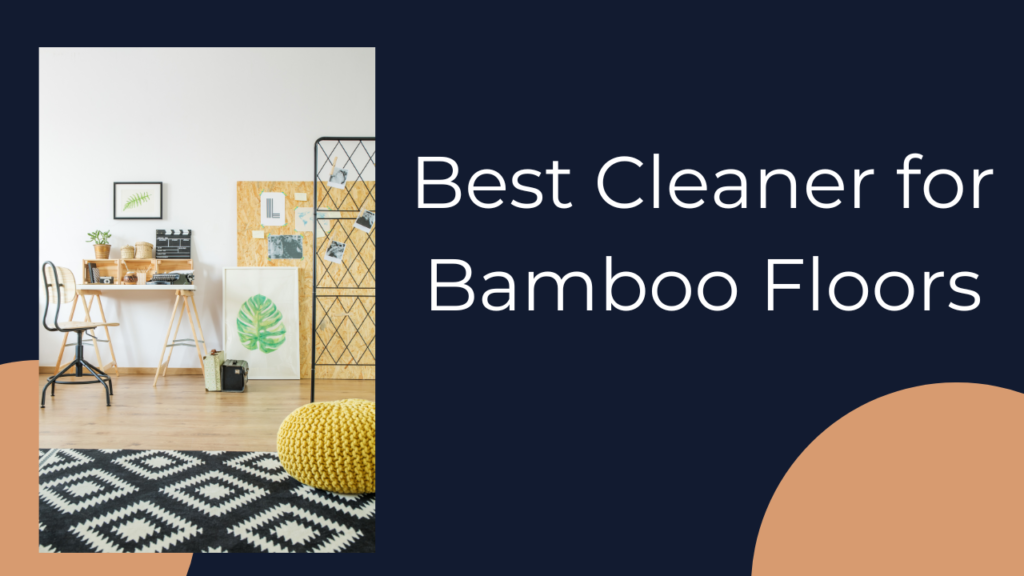Bamboo floors are an increasingly popular choice for homeowners due to their natural beauty, durability, and eco-friendliness. However, maintaining the pristine condition of bamboo flooring requires using the right cleaning methods and products. This comprehensive guide delves into the best cleaner for bamboo floors, ensuring your investment remains in top shape for years to come. We’ll explore various cleaning products, techniques, and best practices to help you make an informed decision.
Bamboo Floors | Why Proper Cleaning Matters
Bamboo flooring is a sustainable alternative to traditional hardwood floors, offering a unique blend of strength and aesthetic appeal. Unlike hardwood, bamboo is a grass, which makes it highly renewable and environmentally friendly. However, despite its durability, bamboo is susceptible to damage from moisture, abrasive cleaners, and harsh chemicals.
Proper cleaning is crucial for maintaining the longevity and appearance of bamboo floors. Using the wrong products or techniques can lead to warping, dullness, and even permanent damage. Before diving into the best cleaners, it’s essential to understand the characteristics of bamboo flooring to ensure you’re treating it with the care it deserves.
Bamboo floors come in several types, including strand-woven, horizontal, and vertical bamboo. Each type has its own texture and grain pattern, which can affect the way it reacts to different cleaning products. For example, strand-woven bamboo is more resilient to moisture and scratches due to its dense construction, while horizontal and vertical bamboo are slightly more delicate.
Moisture is the number one enemy of bamboo floors. Excessive water can cause bamboo to swell, warp, and develop mold. Therefore, it’s critical to use a cleaner that is designed for bamboo floors, as these products are typically pH-neutral and low in moisture. Avoiding harsh chemicals is also important, as they can strip the protective finish off the bamboo, leaving it vulnerable to scratches and stains.

Top Bamboo Floor Cleaners
Finding the best cleaner for bamboo floors involves considering both the type of bamboo flooring you have and the specific cleaning needs of your household. Below, we review some of the top bamboo floor cleaners on the market, highlighting their key features and benefits.
1. Bona Hardwood Floor Cleaner
Why It’s Great
Bona Hardwood Floor Cleaner is a well-known and trusted product in the flooring industry. Although designed for hardwood, it is also suitable for bamboo floors. The formula is water-based and pH-neutral, making it gentle enough for bamboo yet effective at removing dirt and grime.
Features
- Water-based formula: Prevents excessive moisture damage.
- pH-neutral: Safe for bamboo’s delicate finish.
- Ready-to-use: No need for dilution.
User Experience: Customers appreciate how Bona leaves no residue and has a mild, pleasant scent. It’s also known for its streak-free finish, making it a favorite among homeowners with bamboo floors.
Pros
- Easy to use with a spray bottle.
- Dries quickly, reducing the risk of water damage.
- Eco-friendly packaging.
Cons
- Slightly more expensive than some other cleaners.
- May require a microfiber mop for the best results.

2. Method Squirt + Mop Hardwood Floor Cleaner
Why It’s Great:
Method’s Squirt + Mop Hardwood Floor Cleaner is another excellent option for bamboo floors. This product is non-toxic, biodegradable, and free from harmful chemicals, making it safe for both your family and the environment.
Features
- Plant-based formula: Gentle on bamboo while effectively cleaning.
- Squirt and mop design: Convenient and easy to use.
- Available in various scents: Adds a fresh fragrance to your home.
User Experience: Users love the simplicity of the squirt and mop design, which eliminates the need for a bucket or dilution. The cleaner leaves floors shiny and free from streaks, though some users mention that the scent can be a bit strong.
Pros
- Non-toxic and eco-friendly.
- Leaves a pleasant, long-lasting scent.
- Streak-free finish.
Cons
- Strong scent may not appeal to everyone.
- Not as widely available in stores.

3. Black Diamond Stoneworks Wood & Laminate Floor Cleaner
Why It’s Great
Black Diamond Stoneworks offers a versatile cleaner that works well on both bamboo and laminate floors. Its hypoallergenic formula is safe for pets and children, and it’s known for its ability to clean without leaving a dulling residue.
Features
- Hypoallergenic formula: Ideal for homes with pets and children.
- Non-toxic and biodegradable: Safe for the environment.
- Streak-free formula: Leaves floors looking shiny and new.
User Experience: Many users appreciate that this cleaner does not require rinsing and dries quickly. It’s also praised for its effectiveness in removing dirt and stains without causing damage to the floor’s finish.
Pros
- Safe for use around pets and children.
- Quick-drying and non-residue formula.
- Affordable and widely available.
Cons
- Some users find the spray nozzle difficult to use.
- May require frequent application for heavily soiled areas.

4. Eco-Me Floor Cleaner
Why It’s Great:
Eco-Me Floor Cleaner is an excellent choice for those who prefer natural cleaning products. This cleaner is made from plant extracts and essential oils, offering a safe and effective way to clean bamboo floors without harmful chemicals.
Features
- 100% natural ingredients: Free from synthetic fragrances and dyes.
- Safe for all floor types: Including bamboo, tile, and laminate.
- Fresh scent: Derived from natural essential oils.
User Experience: Customers who prioritize natural cleaning products love Eco-Me for its gentle yet effective formula. The scent is fresh but not overpowering, and the cleaner leaves no residue behind.
Pros:
- All-natural formula.
- Pleasant, natural scent.
- Safe for a variety of floor types.
Cons:
- Higher price point compared to other cleaners.
- May require more product for thorough cleaning.

5. Murphy Oil Soap
Why It’s Great
Murphy Oil Soap has been a trusted name in floor cleaning for decades. Its formulation is particularly effective for wood surfaces, making it a suitable choice for bamboo floors as well. Murphy Oil Soap is renowned for its ability to clean without stripping the natural oils and finishes that protect your bamboo floor.
Features
- Natural cleaner: Made with 98% naturally derived ingredients.
- Safe for wood and bamboo: Gentle on finishes, effective on dirt.
- Multi-use: Can be used on a variety of wood surfaces in the home.
User Experience: Users frequently praise Murphy Oil Soap for its long-standing reputation and effectiveness. It’s noted for its pleasant, subtle scent and the way it enhances the natural shine of bamboo floors without leaving a greasy residue.
Pros
- Time-tested formula with a strong reputation.
- Enhances the natural luster of bamboo floors.
- Affordable and easy to find in stores.
Cons
- Requires dilution, which can be less convenient.
- Can leave a slight film if not diluted properly.

Best Practices for Cleaning Bamboo Floors
Using the best cleaner for bamboo floors is just one part of maintaining their beauty and longevity. Proper cleaning techniques and regular maintenance routines are equally important. Let’s explore some best practices for keeping your bamboo floors in pristine condition.
1. Regular Sweeping and Vacuuming
Why It’s Important: Dust, dirt, and small debris are abrasive and can scratch the surface of bamboo floors if not regularly removed. Sweeping or vacuuming frequently is crucial to prevent these particles from causing damage over time.
How to Do It Right: Use a soft-bristled broom or a vacuum cleaner with a hardwood floor attachment to gently remove dirt and dust. Avoid vacuums with beater bars, as they can scratch the surface. Regularly sweeping high-traffic areas like hallways and entrances is essential to keep bamboo floors looking new.
Tips
- Sweep daily or every other day in high-traffic areas.
- Use a microfiber dust mop for a more thorough clean.
- Avoid using vacuum cleaners with rotating bristles.

2. Mopping with a Damp Cloth
Why It’s Important: While bamboo floors are relatively water-resistant, excessive moisture can still cause warping and damage. Mopping with a damp (not wet) cloth helps remove dirt and grime without introducing too much moisture.
How to Do It Right: Use a well-wrung microfiber mop or a soft cloth to clean your bamboo floors. Dampen the cloth with water and your chosen bamboo floor cleaner. Wipe in the direction of the grain to prevent streaks and ensure an even clean. Avoid leaving standing water on the floor, and immediately dry any spills.
Tips
- Mop weekly, or more often in high-traffic areas.
- Always wring out your mop or cloth thoroughly before use.
- Dry the floor immediately after mopping with a clean, dry cloth.

3. Spot Cleaning Spills and Stains
Why It’s Important: Spills and stains should be addressed immediately to prevent permanent damage to bamboo floors. Even though bamboo is relatively resilient, prolonged exposure to liquids can cause staining or warping.
How to Do It Right: For spills, quickly blot the area with a clean, dry cloth. If a stain has already formed, use a bamboo-friendly cleaner to gently remove it. Avoid scrubbing, as this can damage the floor’s finish. For stubborn stains, consult the manufacturer’s guidelines or consider professional cleaning.
Tips
- Address spills immediately to prevent stains.
- Blot, don’t scrub, to protect the finish.
- Use a bamboo floor cleaner for tough stains.

4. Protecting Your Floors from Furniture and Foot Traffic
Why It’s Important: Heavy furniture and foot traffic can cause dents, scratches, and wear on bamboo floors. Taking preventive measures will help maintain their appearance and longevity.
How to Do It Right: Use felt pads or furniture coasters under heavy furniture to prevent scratches. Consider area rugs in high-traffic areas to reduce wear. Additionally, avoid wearing high heels or shoes with sharp soles on bamboo floors, as they can cause damage.
Tips
- Place felt pads under furniture legs.
- Use area rugs in high-traffic areas.
- Encourage a no-shoes policy to reduce dirt and wear.

Eco-Friendly Cleaning Solutions for Bamboo Floors
For those who prioritize environmentally friendly products, there are several DIY and eco-friendly cleaning solutions that are safe for bamboo floors. These solutions are not only effective but also help reduce your environmental footprint.
1. Vinegar and Water Solution
Why It’s Great: A vinegar and water solution is a simple, cost-effective, and eco-friendly way to clean bamboo floors. Vinegar is a natural disinfectant and deodorizer, making it perfect for maintaining the cleanliness of your floors.
How to Use It: Mix one part white vinegar with four parts water in a spray bottle. Lightly mist the floor and mop with a microfiber mop or cloth. Be sure to dry the floor immediately after cleaning to prevent water damage.
Tips
- Avoid using too much vinegar, as its acidity can damage the finish.
- Always dry the floor thoroughly after mopping.
- Test the solution in an inconspicuous area before using it on the entire floor.
2. Castile Soap and Water
Why It’s Great: Castile soap is a gentle, plant-based soap that can be used on bamboo floors. It’s effective at removing dirt and grime without leaving a residue, and it’s biodegradable, making it an excellent eco-friendly option.
How to Use It: Mix a few drops of Castile soap with warm water in a bucket. Use a damp mop to clean the floor, then dry it immediately with a clean cloth. This solution is safe for regular use and leaves floors looking clean and shiny.
Tips
- Use only a small amount of soap to prevent residue buildup.
- Rinse the mop frequently to avoid spreading dirt.
- Dry the floor immediately after cleaning.
3. Essential Oil Cleaner
Why It’s Great: Essential oils not only add a pleasant fragrance to your home but also have natural cleaning properties. When combined with water, they can be used to clean bamboo floors effectively.
How to Use It: Mix a few drops of your favorite essential oil (such as lavender or tea tree) with water in a spray bottle. Lightly mist the floor and mop with a microfiber cloth. The essential oil will leave a fresh scent while also helping to remove dirt.
Tips
- Choose essential oils that are safe for use on floors.
- Test the mixture in a small area before using it on the entire floor.
- Always dry the floor after cleaning to prevent moisture damage.

FAQs About Cleaning Bamboo Floors
1. Can I use a steam mop on bamboo floors?
No, steam mops are not recommended for bamboo floors. The heat and moisture from steam mops can cause the bamboo to warp and damage the finish. It’s best to use a damp cloth or mop instead.
2. How often should I clean my bamboo floors?
It’s recommended to sweep or vacuum bamboo floors daily or every other day, especially in high-traffic areas. Mopping should be done weekly, or as needed, to remove dirt and grime.
3. Can I use vinegar to clean bamboo floors?
Yes, but it should be diluted with water. A solution of one part vinegar to four parts water is generally safe. However, avoid using too much vinegar as its acidity can damage the floor’s finish.
4. What should I do if my bamboo floor gets scratched?
For minor scratches, you can use a bamboo floor repair kit or a wax stick designed for wood floors. For deeper scratches, consider sanding and refinishing the affected area.
5. Are there any cleaners I should avoid using on bamboo floors?
Avoid using abrasive cleaners, harsh chemicals, and products that contain ammonia or bleach. These can damage the finish and cause discoloration or other issues.
6. Can I use furniture polish on bamboo floors?
No, furniture polish is not suitable for bamboo floors as it can make them slippery and may leave a residue. Stick to cleaners that are specifically designed for wood or bamboo floors.
7. What’s the best way to prevent water damage to bamboo floors?
Avoid using excessive water when cleaning. Always dry the floor immediately after mopping, and clean up spills promptly. Using area rugs in moisture-prone areas can also help.
8. Can I use a vacuum cleaner on bamboo floors?
Yes, but make sure to use a vacuum cleaner with a hardwood floor attachment. Avoid vacuums with beater bars, as they can scratch the surface of bamboo floors.
Final Words
Maintaining bamboo floors requires a combination of the right cleaning products and proper techniques. Whether you opt for a commercial cleaner like Bona Hardwood Floor Cleaner or prefer a natural solution like vinegar and water, the key is to use products that are gentle on bamboo while effectively removing dirt and grime.
By following the best practices outlined in this guide, you can keep your bamboo floors looking beautiful for years to come. Regular sweeping, cautious mopping, and immediate attention to spills are essential steps in preserving the longevity and appearance of your bamboo flooring.


